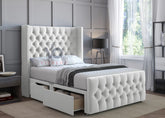Find Your Dream Mattress with These Expert Tips
When it comes to getting restful sleep, your mattress plays a crucial role. Most people spend about a third of their lives in bed, yet many don't give enough thought to choosing the right mattress.
Our expert mattress buying tips will help you navigate the sometimes confusing world of mattresses so you can find the perfect balance of comfort and support for your unique needs.
Why Your Mattress Choice Matters
A good mattress does more than just provide a place to sleep. It supports your body, helps maintain proper spinal alignment, and can significantly impact your overall health and well-being. Poor sleep quality has been linked to various health issues, including back pain, increased stress levels, and reduced immune function.
Many people continue sleeping on old and worn-out mattresses without realizing how much it affects their sleep quality. Research shows that a new mattress can improve sleep quality by up to 55% and reduce back pain by 48%. Finding the right mattress can truly transform your sleep experience.
Understanding Different Mattress Types
Before diving into specific recommendations, let's explore the main types of mattresses available today:
Memory Foam Mattresses
Memory foam mattresses have become increasingly popular due to their excellent pressure relief and body contouring properties. These mattresses are made from viscoelastic foam that responds to your body heat and weight, creating a custom-fitted feel.
Pros:
-
Excellent pressure point relief
-
Reduces motion transfer, making it ideal for couples
-
Conforms to your body shape for personalized support
Cons:
-
Can retain heat (though newer models address this issue)
-
May have an initial chemical odor
-
Some people find the sinking feeling uncomfortable
Innerspring Mattresses
The traditional bed mattress type, innerspring mattresses, uses a system of metal coils or springs to provide support. These mattresses have been around for decades and remain popular due to their familiarity and affordability.
Pros:
-
Good airflow and cooling
-
Responsive bounce
-
Generally more affordable
Cons:
-
Less pressure relief than foam options
-
More motion transfer
-
May develop sagging over time
Pocket Sprung Mattresses
A more advanced version of innerspring mattresses, pocket sprung mattresses feature individual fabric-wrapped coils that move independently. This design offers better support and reduces motion transfer compared to traditional innerspring models.
Pros:
-
Excellent support that adapts to your body
-
Reduced motion transfer compared to traditional innersprings
-
Better airflow than all-foam mattresses
Cons:
-
Higher price point than basic innerspring mattresses
-
Heavier and harder to move
-
May still transfer some motion
Latex Mattresses
Made from natural or synthetic rubber, latex mattresses offer a responsive, bouncy feel with good support. Natural latex is also an environmentally friendly option.
Pros:
-
Naturally hypoallergenic and resistant to dust mites
-
Excellent durability (can last 15+ years)
-
Responsive support without the sinking feeling of memory foam
Cons:
-
Higher price point, especially for natural latex
-
Heavier than other mattress types
-
Some people find them too firm
Hybrid Mattresses
Hybrid mattresses combine the best features of foam and innerspring mattresses, typically featuring a coil support system with foam comfort layers on top.
Pros:
-
Balance of support and comfort
-
Better temperature regulation than all-foam mattresses
-
Reduced motion transfer compared to traditional innersprings
Cons:
-
Higher price point
-
Heavier than all-foam mattresses
-
May not provide the specific benefits of either type at their best
Choosing the Right Mattress Firmness
Mattress firmness is measured on a scale from 1 to 10, with 1 being extremely soft and 10 being extremely firm. Most mattresses fall between 3 and 8 on this scale. Your ideal firmness level depends on several factors:
Body Weight
-
Lightweight sleepers (under 130 lbs): Usually prefer softer mattresses (3-5 firmness) that allow some sinking for pressure relief.
-
Average weight sleepers (130-230 lbs): Often do well with medium firmness (5-7) that balances support and comfort.
-
Heavyweight sleepers (over 230 lbs): Typically need firmer mattresses (7-8) for adequate support without excessive sinking.
Sleeping Position
-
Side sleepers: Need softer mattresses (3-6 firmness) to cushion pressure points at the shoulders and hips.
-
Back sleepers: Generally prefer medium to medium-firm mattresses (5-7) that support the natural curve of the spine.
-
Stomach sleepers: Usually require firmer mattresses (7-8) to keep the hips from sinking too deeply.
-
Combination sleepers: Often do best with medium firmness (5-7) that can accommodate different position
Special Considerations
If you suffer from back pain, a medium-firm to firm mattress (6-8) is often recommended. Studies have shown that medium-firm mattresses can help reduce chronic lower back pain. An orthopedic mattress, specifically designed to support the spine and joints, might be worth considering.
Dr. Michael Breus, a clinical psychologist and sleep specialist, notes: "For back pain sufferers, the most important factor is maintaining proper spinal alignment during sleep. A mattress that's too soft can cause the spine to curve unnaturally, while one that's too firm can create pressure points."
Finding the Right Mattress Size
Choosing the right bed mattress size is crucial for comfort and room aesthetics. Here's a breakdown of standard mattress sizes in the US:
|
Mattress Size |
Dimensions (cm) |
Best For |
|
Small Single |
75 × 190 |
Children or very small rooms |
|
Single |
90 × 190 |
Teenagers or single adults |
|
Small Double (Queen) |
120 × 190 |
Solo sleepers who want extra space |
|
Double |
135 × 190 |
Couples who don’t mind sleeping close or solo comfort |
|
King |
150 × 200 |
Couples needing more room to stretch |
|
Super King |
180 × 200 |
Maximum space for couples or families sharing a bed |
When choosing a mattress size, consider:
-
Room dimensions (leave at least 2 feet of walking space around the bed)
-
Who will be using the mattress
-
Your height and body size
-
Whether pets sleep in the bed
Understanding Mattress Lifespan and When to Replace
Even the best bed mattress won't last forever. Understanding the typical lifespan of different mattress types can help you plan for replacement:
|
Mattress Type |
Mattress Lifespan |
|
Innerspring mattress |
5-7 years |
|
Memory foam mattress |
8-10 years |
|
Latex mattress |
12-15+ years |
|
Hybrid mattresses |
6-8 years |
|
Pocket sprung mattresses |
7-9 years |
Although every mattress can last for more than 5 years, it's better to know when to get a new one. Here are some signs that it's time to replace your mattress:
-
Visible sagging or indentations
-
Waking up with pain or stiffness
-
Feeling tired despite getting enough hours of sleep
-
Increased allergy symptoms
-
Noticeable deterioration in comfort
Mattress Accessories for a Better Sleep Experience
Mattress Toppers
A mattress topper can add an extra layer of comfort to your existing mattress or adjust its firmness. They're available in various materials including memory foam, latex, wool, and down alternative. Check below to know when to consider a mattress topper:
-
To extend the life of an aging mattress
-
To adjust the firmness of a new mattress that's too firm
-
To add cooling properties to a mattress that retains heat
-
As a less expensive alternative to buying a new mattress
Mattress Protectors
A mattress protector is an essential investment that can significantly extend the life of your mattress. These fitted covers protect against:
-
Spills and stains
-
Dust mites and allergens
-
Bed bugs
-
Normal wear and tear
Many protectors are waterproof while still remaining breathable, and some even offer additional benefits like cooling properties or extra padding.
Tips for Shopping a Durable Mattress
Testing a Mattress
When shopping in person, take time to properly test each mattress:
-
Lie down in your usual sleeping position for at least 10-15 minutes
-
Try different positions to ensure comfort in each
-
If shopping with a partner, test the mattress together
-
Pay attention to pressure points and support
Online Mattress Shopping
The bed-in-a-box revolution has made online mattress shopping increasingly popular, where brands like Vizbeds UK offer various mattress types like innerspring, memory foam, latex, hybrid, and pocket sprung mattresses. Benefits of shopping for a mattress include:
-
Convenient shopping from home
-
Often lower prices due to reduced overhead costs
-
Extended trial periods (typically 100 nights or more)
-
Free shipping and returns
When shopping online, carefully read reviews, check return policies, and make sure you understand the trial period terms.
Budget Considerations
Mattress prices vary widely, from a few hundred dollars to several thousand. While you don't need to buy the most expensive mattress, consider this an investment in your health. A good rule of thumb is to buy the best mattress you can afford, as the quality of your sleep directly impacts your daily life.
Many mattress companies offer financing options, and sales around holidays like Presidents' Day, Memorial Day, and Black Friday can offer significant savings.
Special Needs and Considerations
Adjustable Beds
If you're looking for a mattress for an adjustable bed, flexibility is key. The best options include:
-
Memory foam mattresses
-
Latex mattresses
-
Some hybrid mattresses (check manufacturer specifications)
Avoid traditional innerspring mattresses, as they typically don't bend well with adjustable bases.
Allergies and Sensitivities
For those with allergies or sensitivities, consider:
-
Natural latex mattresses (for those without latex allergies)
-
Hypoallergenic memory foam mattresses
-
Mattresses with removable, washable covers
-
Always using a quality mattress protector
Temperature Regulation
If you sleep hot, look for mattresses with cooling technologies:
-
Gel-infused memory foam
-
Open-cell foam structures
-
Hybrid mattresses with coil systems for airflow
-
Covers made with phase-change materials or natural fibers like cotton
Final Thoughts
Choosing the best bed mattress is a personal decision that depends on your specific needs, preferences, and budget. Remember that what works for someone else might not work for you.
Take advantage of trial periods to ensure your mattress is truly the right fit. Most quality mattress companies now offer generous trial periods, allowing you to test the mattress in your home for several months.
Finally, don't forget that a good mattress is just one component of a healthy sleep environment. Consider your pillows, bedding, room temperature, sleep habits and most importantly, a premium quality bed as part of your overall sleep strategy.
With the right mattress that addresses your unique needs, you can look forward to years of comfortable and restorative sleep along with improved health and well-being.





